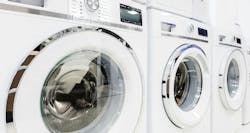Washing-Machine Tariffs Come Out Clean, Sparkling for US Manufacturing
OPINION
In January 2018, the Trump administration imposed tariffs of 20% to 50% on large residential washing machines. The tariffs expired in February 2023. Six years after these tariffs were imposed, the U.S. now has a larger, more successful, and more competitive domestic washing machine industry.
The tariffs were a success, as measured by over 2,000 new jobs, more competition, no sustained effect on washing machine prices and economic stimulus with the construction of new factories.
The tariffs brought jobs and economic prosperity to two regions where appliances were not previously manufactured: Clarksville, Tennessee and Newberry, South Carolina.
No Long-Term Effect on Prices
Tariff opponents continue to repeat the falsehood that the tariffs raised washing machine prices. But washing machines fit a pattern we’ve seen with many of the 2018-2019 tariffs: After a brief price surge, consumer prices of the tariffed products fall, and tariffs have no noticeable effect on those prices afterwards.
In 2017, then-U.S. Trade Representative Robert Lighthizer decided to impose tariffs on all imported large residential washing machines. When these duties were imposed in January 2018, they started at 20%. After a quota of 1.2 million imported washers was reached, the duties rose to 50%.
Large washing machine importers, including LG Electronics and Samsung, initially opposed any U.S. import restrictions. However, once the tariffs were in place, they quickly changed their tune.
Samsung, LG Build U.S. Factories
In 2018, LG Electronics completed an investment of $360 million in a new smart factory in Clarksville, to be staffed with 700 employees. In April 2021, the company announced that it had produced 1 million washing machines at Clarksville. LG then announced that it was investing a further $20.5 million and hiring 300 more employees in Clarksville. And then, in December 2022, LG announced three new model washing machines to be made in Clarksville.
Similarly, in 2018, Samsung built an appliance manufacturing facility in Newberry, South Carolina, investing $350 million and hiring 1,000 employees. This was so successful that in 2020, Samsung invested an additional $120 million to expand the facility. It now employs 1,200 workers.
Tariffs = More Jobs, More Competition
Essentially, by incentivizing both LG Electronics and Samsung to open and then expand manufacturing facilities in the United States, the tariffs achieved the best of both worlds. They led to the creation of more U.S.-based competitors—with more jobs and more competition. And, they resulted in more domestic product innovation as well. Finally, the only impact on prices was gone in a few months, and washing machine prices declined to pre-tariff levels.
The new U.S.-based manufacturers will also prompt existing U.S. manufacturers, Whirlpool and GE Appliance, to up their game. Those two account for over 40,000 employees, so their competitive performance is important.
The goal of industrial policies such as targeted tariffs should be to build domestic industries. Doing so creates growth, investment, employment and an upward trend in worker incomes. That has positive effects for the upstream and downstream industries that supply the appliance industry and the economy as a whole.
Six years later, we can see that the washing machine tariffs achieved precisely these goals.
Jeff Ferry is chief economist at the Coalition for a Prosperous America.
About the Author
Jeff Ferry
Jeff Ferry is chief economist at the Coalition for a Prosperous America (CPA).
